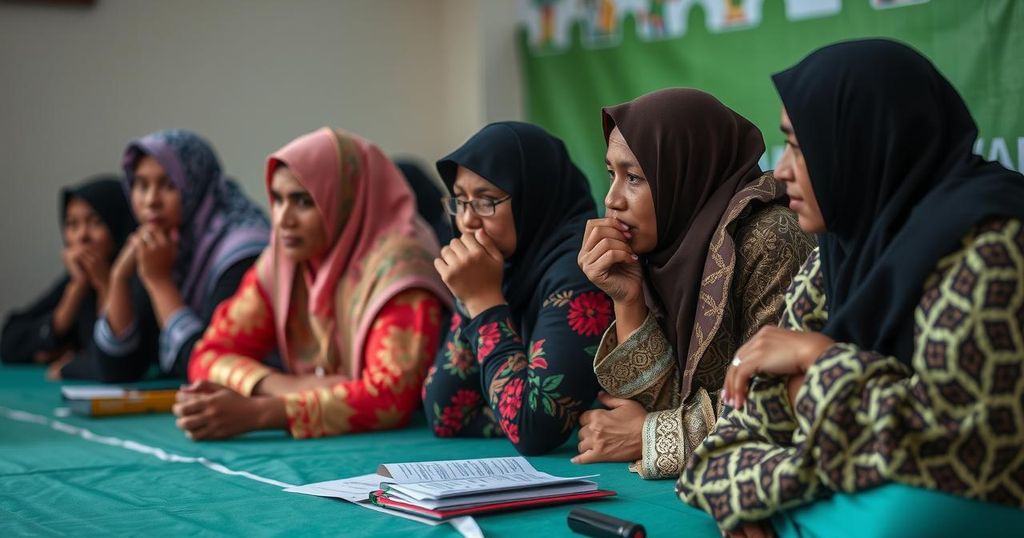Following the fall of Assad’s regime in Syria, analysts recommend Indonesia repatriate nearly 400 IS-linked citizens to prevent further radicalization. The National Counterterrorism Agency is assessing individuals for safe return and deradicalization strategies, marking a policy shift under President Prabowo Subianto. Complexities around legal status and community acceptance highlight the need for a structured approach to ensure successful integration and address underlying security concerns.
In light of the recent regime change in Syria following the fall of President Bashar al-Assad, analysts are advocating for the repatriation of almost 400 Indonesian citizens associated with the Islamic State (IS) militant group currently in Syria. They emphasize the need to repatriate individuals to prevent further radicalization or exploitation in ongoing conflicts globally. Yanuardi Syukur, from the University of Indonesia, urges the government to initiate discussions with the new Syrian leadership to ensure safe repatriation and necessary deradicalization measures. The National Counterterrorism Agency (BNPT) is actively evaluating which individuals can be safely returned, focusing on rehabilitation and reintegration strategies. This represents a notable shift in Indonesia’s policy under the new administration of President Prabowo Subianto, compared to the previous government’s stance. The complexities surrounding the repatriation process highlight the potential for previous returnees to revert to extremist behaviors, stressing the importance of community acceptance and tailored rehabilitation programs to ensure successful reintegration.
Conditions within the al-Hol and Roj camps in Syria are dire, presenting numerous challenges for repatriation efforts. Analysts have warned that many families, including 145 children, face substandard living conditions and the risk of further radicalization if not repatriated. The ongoing conflict in Syria necessitates a pragmatic approach regarding the return of Indonesian nationals. Experts posit that a phased repatriation process, contingent upon an assessment of risk profiles and radicalization levels, is imperative. Collaboration with civil society organizations specializing in counterterrorism and deradicalization can support rehabilitation initiatives, emphasizing the need for societal inclusion to mitigate recidivism rates among returnees. The matter of legal status for many children in the camps, born to Indonesian and foreign parents, complicates the repatriation process, requiring careful navigation of citizenship laws to afford them necessary protections.
The Syrian conflict, largely triggered in 2011 by widespread anti-government protests during the Arab Spring, has resulted in a significant dilemma for numerous countries faced with the potential return of their nationals associated with extremist movements. Indonesia, as the largest Muslim-majority nation, has a complicated history with Islamist violence, making the discourse surrounding repatriation highly sensitive. Observations by the BNPT indicate that the situation within Syria is continually evolving, with notable shifts in the political landscape offering both opportunities and risks associated with the repatriation of Indonesian nationals. Given the tumultuous history of returnees and their potential for reinvigorating terrorist networks, analysts maintain that a comprehensive, structured approach is essential to correctly address the needs of repatriated individuals while safeguarding national security.
In conclusion, the case for repatriating Indonesian nationals linked to the Islamic State in Syria is underscored by the need to prevent potential radicalization and exploitative scenarios. The government’s commitment to a strategic, phased repatriation and deradicalization process, as advocated by experts, is crucial to addressing the multifaceted challenges associated with these individuals returning to Indonesia. The necessity for tailored rehabilitation programs and community readiness to support these returnees will play a pivotal role in fostering successful integration, thereby striving toward long-term peace and security both domestically and in the broader region.
The Syrian civil war has produced complex challenges regarding foreign fighters and their families, with Indonesia currently facing the dilemma of how to handle its nationals linked to the Islamic State group. Amirial estimates place approximately 375 Indonesian citizens, including children, in camps in Syria, which are notorious for their inadequate conditions and potential for indoctrination. This situation has become more pressing following the overthrow of the Assad regime, as opportunities present themselves for negotiations with the new Syrian leadership. Indonesia has a historical context marked by Islamist militancy, making the topic of radicalized individuals particularly sensitive and requiring cautious policy shifts to address national security concerns while upholding humanitarian principles.
The imperative for Indonesia to repatriate and deradicalize citizens associated with the Islamic State in Syria is increasingly pressing, given the evolving political landscape and the risks of continued confinement in volatile conditions. A phased, carefully evaluated approach to repatriation, combined with localized support for rehabilitation and community acceptance, is vital for a successful reintegration of former militants and their families. Balancing national security with humanitarian responsibilities will play a critical role in mitigating the potential for returning individuals to reintegrate into extremist networks.
Original Source: www.benarnews.org






